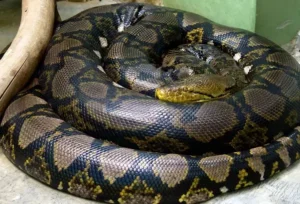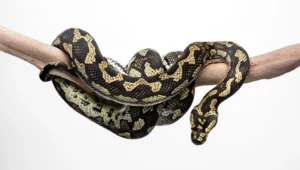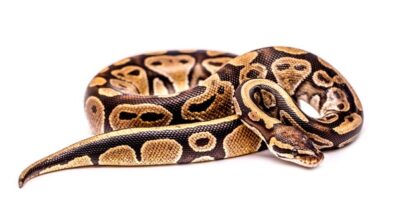Are carpet pythons aggressive? This question often arises among reptile enthusiasts and prospective pet owners alike. Delving into the fascinating world of these serpents, we uncover a spectrum of behaviors and temperaments.
Carpet pythons are generally not considered aggressive towards humans. While they may display defensive behaviors if they feel threatened, such as hissing or striking, they are usually quite tolerant and can become quite docile with regular, gentle handling.
Like all snakes, they prefer to avoid conflict and will typically retreat rather than confront a perceived threat. However, individual temperament can vary, so it’s essential to handle them with care and respect.
Understanding Carpet Pythons

Carpet pythons are fascinating reptiles native to Australia and New Guinea. Here’s some key information to help you understand them better:
- Species: Carpet pythons belong to the genus Morelia, and there are several subspecies, including the coastal carpet python (Morelia spilota), the jungle carpet python (Morelia spilota cheynei), and the diamond python (Morelia spilota spilota), among others.
- Appearance: They are large snakes, with adults reaching lengths of 5 to 12 feet, depending on the subspecies. They have a slender build, and their coloration and pattern vary depending on their specific subspecies and locality. Generally, they have a beautiful pattern of irregular markings that can vary from browns to greens to black.
- Habitat: Carpet pythons are found in a variety of habitats, including forests, woodlands, and even urban areas. They are often found near water sources.
- Diet: In the wild, carpet pythons primarily feed on small mammals, birds, and occasionally reptiles. In captivity, they are typically fed rodents like mice and rats.
- Behavior: Carpet pythons are generally nocturnal and solitary animals. They are excellent climbers and spend much of their time in trees, where they hunt for prey and bask in the sun.
- Reproduction: Female carpet pythons lay clutches of eggs, usually between 10 and 50 eggs, depending on the size and age of the female. The female will incubate the eggs by coiling around them to keep them warm until they hatch.
- Care: Carpet pythons are popular pets among reptile enthusiasts. They require a large enclosure with branches for climbing and a secure hiding place. They need a temperature gradient within their enclosure, with a warm basking spot and cooler areas to regulate their body temperature.
- Legalities: Depending on where you live, there may be laws and regulations regarding the ownership of carpet pythons. Be sure to check your local laws before acquiring one as a pet.
Carpet pythons are generally docile snakes, but like all reptiles, they should be handled with care and respect. With proper care, they can make fascinating and rewarding pets.
Are carpet pythons aggressive?
Carpet pythons are not generally considered aggressive, but like any animal, their behavior can vary depending on various factors including individual temperament, handling, and environmental conditions.
Here are some important points to consider:
- Temperament: Carpet pythons are usually known for their docile nature. They are not typically aggressive towards humans and are often quite tolerant of handling, especially if they have been properly socialized.
- Handling: Regular, gentle handling from a young age can help ensure that a carpet python remains calm and accustomed to human interaction.
- Stress: Like all snakes, carpet pythons can become defensive or agitated if they feel threatened or stressed. Providing a suitable enclosure with plenty of hiding spots and a secure environment can help reduce stress.
- Size and Age: Larger and older carpet pythons may be more confident and less likely to feel threatened compared to younger or smaller snakes.
While carpet pythons are generally not aggressive, it’s essential to remember that all snakes have the potential to bite if they feel threatened or cornered. With proper handling and care, however, instances of aggression are rare, and carpet pythons can make fantastic pets for reptile enthusiasts.
Factors Affecting Aggression

Several factors can influence the behavior of carpet pythons and contribute to instances of aggression. Here are some key factors to consider:
- Individual Temperament: Just like people, individual snakes can have different temperaments. Some may be naturally more docile, while others may be more defensive or prone to aggression.
- Handling and Socialization: Carpet pythons that are handled frequently and gently from a young age are more likely to be tolerant of human interaction. Conversely, snakes that have not been handled much may be more nervous or defensive when approached by humans.
- Health and Stress: A snake that is stressed or in poor health may be more likely to exhibit aggressive behavior. Factors such as inadequate housing, inappropriate temperatures, and improper feeding can all contribute to stress in snakes.
- Breeding Season: During the breeding season, male carpet pythons may become more territorial and aggressive, especially if they are housed together or if a male detects the presence of a female nearby.
- Environmental Factors: Environmental factors such as temperature, humidity, and the size and layout of the enclosure can all affect a snake’s behavior. A snake that does not have adequate hiding spots or feels exposed may become stressed and more likely to exhibit defensive behaviors.
- Feeding: Snakes that are hungry or have recently eaten may be more defensive, as they may perceive any approach as a potential threat to their meal.
By understanding these factors and providing appropriate care and handling, you can help minimize the likelihood of aggression in carpet pythons and ensure that they remain happy and healthy pets.
Signs of Aggression

Recognizing signs of aggression in carpet pythons is essential for both your safety and the well-being of the snake. Here are some common signs of aggression in carpet pythons:
- Defensive Posture: When feeling threatened, a carpet python may adopt a defensive posture. This includes coiling into a tight ball, flattening its body, and hissing.
- Striking: Agitated carpet pythons may strike out defensively, either with an open mouth or a closed mouth. While striking is often a warning rather than an actual attempt to bite, it’s essential to take this behavior seriously.
- Rapid Tail Vibrations: Some carpet pythons will vibrate their tails rapidly against a surface when they feel threatened or agitated. This behavior is often seen in conjunction with other defensive behaviors.
- Puffing Up: Aggressive carpet pythons may puff up their bodies to appear larger and more threatening.
- Sudden Movements: A carpet python that is feeling threatened may make sudden, jerky movements, such as lunging or recoiling rapidly.
- Striking Repeatedly: If a carpet python continues to strike or lunge repeatedly without retreating, it may be exhibiting aggressive behavior.
It’s important to remember that a carpet python may display these behaviors if it feels threatened or stressed, even if it is not inherently aggressive. If you notice these signs, it’s essential to give the snake space and time to calm down.
Also, handling should only be attempted once the snake has had a chance to relax. Always approach snakes slowly and calmly to minimize stress and reduce the risk of aggression.
Handling Aggressive Carpet Pythons
Handling an aggressive carpet python can be challenging and requires caution to avoid injury to both yourself and the snake. Here are some steps to follow if you need to handle an aggressive carpet python:
- Assess the Situation: Before attempting to handle the snake, assess the reasons for its aggression. Ensure that the snake is not feeling threatened due to factors such as inadequate housing, improper temperatures, or hunger.
- Use Proper Equipment: When handling an aggressive snake, it’s essential to use the right equipment to minimize the risk of injury. A snake hook or snake tongs can be used to gently restrain the snake without risking a bite.
- Approach Slowly: Approach the snake slowly and calmly, avoiding sudden movements that may further agitate it.
- Support the Body: When picking up the snake, support its body to minimize stress and prevent injury. Avoid grabbing the snake by the tail, as this can further agitate it.
- Stay Calm: Remain calm and confident while handling the snake. Snakes can sense fear and may become more agitated if they sense that you are nervous or anxious.
- Minimize Handling: If possible, avoid unnecessary handling of the snake, especially if it is displaying aggressive behavior. Once the snake has calmed down, return it to its enclosure as quickly as possible.
- Consult a Professional: If you are unsure how to handle an aggressive snake safely, or if the aggression persists, it’s essential to seek advice from a professional reptile handler or veterinarian.
Remember, handling an aggressive snake can be risky, and it’s essential to prioritize safety at all times. If you are uncomfortable handling an aggressive snake or if you are unsure how to do so safely, it’s best to seek assistance from someone with more experience.
Conclusion
Are carpet pythons aggressive? While individual temperament varies, carpet pythons are generally docile and not aggressive towards humans. However, they may exhibit defensive behaviors if they feel threatened or stressed. With proper care, handling, and understanding of their behavior, instances of aggression can be minimized, making carpet pythons fascinating and rewarding pets.

